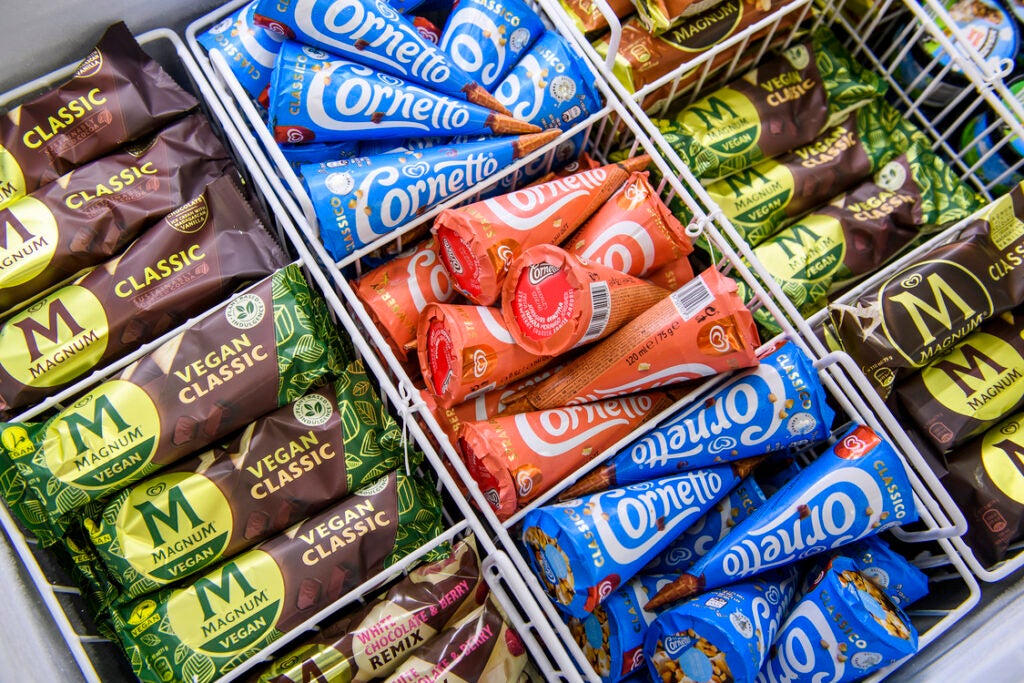Four months into the role, Unilever chief Hein Schumacher has deflected any prospect that food might be spun-off as a separate business unit.
The question was posed by a number of analysts yesterday (26 October) as Schumacher presented an ‘action plan’ to revive Unilever’s performance, including restoring volumes in nutrition and ice cream, improving group competitiveness and market share and fostering more impactful innovation.
“Our performance in nutrition and ice cream needs to improve from here,” Schumacher said, as the Hellmann’s mayonnaise and Magnum ice-cream maker reported a decline in volumes across those divisions, while volumes rose in other business areas - personal and home care, and beauty and wellbeing.
His predecessor Alan Jope had also warded off the possibility of spinning out food - nutrition and ice cream - during his tenure, although he did reorganise Unilever’s business units last year.
Schumacher stated there would be “no major transformational acquisitions”, prompting prodding from one analyst on potential disposals or splitting up food if the segment does not improve performance.
“We see the biggest value creation opportunity in operating our current businesses very well,” the CEO, who took up the role on 1 July, said in response during a Q&A session with analysts.
“Things can always change at some point in time but I believe that the current value-creation opportunity that is on the table is really to improve our business that we have, while we continue to optimise the portfolio like we've done in the last two to three years.”
"Losing share"
Schumacher explained his tasks and challenges for Unilever as a group during his opening presentation.
“I'm not happy with our overall competitiveness, and although there are positions where we are fully competitive, and some areas where we have made conscious choices to delist unprofitable volume, there are still too many situations where we are losing share because, for example, competition is premiumising faster or executing better than we are," he said.
“That means recognising that across a number of important metrics, the quality of performance has fallen short. Taken over the last six years, volume growth has been lacking, competitiveness has struggled to get to, and stay at the levels expected, and that's not good enough.”
From a food perspective, Unilever’s volumes in nutrition and ice cream dropped in the third quarter and over the year so far, although the categories posted underlying sales growth (USG).
In ice cream, Unilever said volumes were impacted by consumers downgrading to “value formats” with private label gaining market share, and also because of the “less favourable” summer weather, particularly in Europe.
Third-quarter retail ice-cream volumes fell 10.1% and were down 6.9% year to date, influencing all category volumes in Europe. For the group across all categories in that region, volumes declined 10.7% and 8.1%, respectively.
Nutrition volumes dropped 3.8% and 2.6%.
Schumacher was asked if pricing had an impact on ice-cream and nutrition volumes as Unilever raised prices by 8.2% and 10.4%, respectively, in the two periods for the former, and 9.8% and 11.6% for the latter.
“I don't think that we have priced too much. Certainly not. In fact, if you look at total input costs, and to the extent that we have priced, we have not fully recovered inflation and gross margins, [which] particularly in Europe remain somewhat under pressure," he said.
Outgoing CFO Graeme Pitkethly, whose successor Fernando Fernandez was named yesterday, added: “Nutrition and ice cream are still responding to high input-cost inflation and we also working on portfolio improvement, especially in Europe.
“But although the landscape remains volatile, we do see the path back to positive overall volumes at group level as pricing moderates, and this gives us the confidence to maintain our outlook for the full year.”
That guidance is a group USG print of 3-5%, with Schumacher confident the metric will exceed the top level as he emphasised an objective to continue to focus on Unilever’s so-called billion-euro ‘power brands’, representing 70% of turnover.
“They represent our biggest value-creation opportunity, which means they need to be brilliantly executed and consistently supported before anything else,” Schumacher explained. “And this doesn't mean other brands are not important or will be sold or under-invested.”
He added: “We will continue to prune the portfolio in areas that are less strategically attractive. This will be accompanied by selective bolt-on acquisitions focused in specific high-growth areas, provided they meet the higher bar for M&A criteria and parameters for value creation.”









